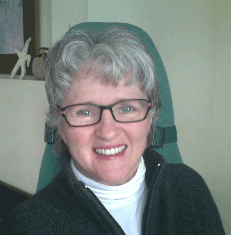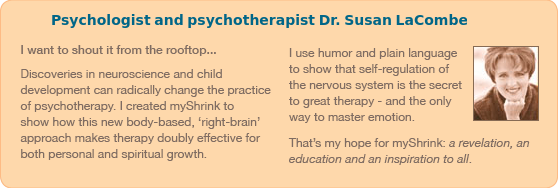Repeating the same old relationship mistakes with a new look, new location, new partner?
Relationships are triggering!
Our close relationships tend to be the most triggering of all our connections. They get their power from the fact that they stir up unprocessed childhood feelings.

New relationships don't even provide immunity . . . you're triggered in the same way . . . then you find yourself repeating or receiving the same hurtful statements.
And even though you did your utmost to avoid going down this same path, here you are again.
There's actually a good reason why it's happening once again. You're engaging in a reenactment.
A reenactment is an extremely clever strategy that emerges from your unconscious for the purpose of positively working through an earlier experience.
Okay, let's unpack that.
Basically . . . we get drawn into replaying an important scene(s) from our life in the hopes of having a different ending.

myShrink's own Rebel Shrink, Psychologist Dr. Susan LaCombe
Updated: July 24, 2024
Dr. LaCombe is a specialist in understanding why we get triggered and how to uproot our triggers at the core by using neuroscience.

We're often drawn to certain people for a reason. We're all connected you see.
This motive for a "different ending" isn't a mere thought nor is it insignificant. Your brain isn't driving you in this direction for some mysterious reason.
When during a childhood experience(s) the sense of yourself, your integrity, self-worth or self-esteem is assaulted it affects you on many levels. You hold that unfinished business in the deep recesses of your brain's data banks waiting for the right time for it to be rectified.
The side effects of the nervous system holding this energy at bay—until it does get resolved—affects your health, behavior, emotions, and cognitive abilities. You see, as neuroscience explains, you can't separate your mind, body and emotions.
Notice that these major functions optimize your ability to survive in the world. So it's in the brain's best interest that you find a way to process and finish what didn't get done.
Just know that the "scene" from your past that I refer to above may look quite different from what you're dealing with today. However the script and energy that's driving your present day issue, is no doubt unmistakably familiar.
Ask yourself, where has this theme showed up in your life?
Relationship Repeat Patterns:
Going down the same road
Recognize this?
We'll repeat statements (eg. "You're always on my case." "It's your fault.") even tho it rarely generates a positive step forward.

We'll enter relationships and have the same issues show up. (eg. "He never listens to me.")
And even tho we're fiercely determined to avoid the same type of person, sadly months or years later we realize, we've done it again!
Making the Same Relationship Mistakes: There's a Good Reason
Yes, we'll repeat a reaction even though it hasn't worked in the past.
On the outside this repetitive remark might not appear to serve a purpose. However, there is meaning in the madness . . . as they say.

Let's consider, for example, that you have never felt "heard" in your family of origin.
You recall that your parents were often busy and never got along.
That left little time for you and your sister.
Unconsciously, you learned to avoid getting your parents upset with your concerns as it seemed the family was already under stress.
That's an optimal strategy that works for a while.
However, as the family dynamics never did change, you missed out on the important developmental stage of being comfortable in identifying and expressing your needs.
So in later intimate relationships, you found it hard to assert your needs especially if you felt they were at odds with your partner. (You see, as a child when 'attuned care' is limited, you'll learn to tolerate more than you care to and you'll naturally give up your needs to preserve the family's survival.)
Eventually, you end up feeling your partner doesn't care. A string of failed relationships leaves you feeling the exact same way, unheard and uncared about.
No matter how positive the relationship starts, it eventually plays out the same familial pattern you're familiar with.
Despite your ability to observe these patterns, you inevitably feel powerless to avoid reenacting the same scenario.
Relationship Mistakes Emerge from Childhood Early Patterns
Finally, after doing enough of your own personal work working with triggers related to the deficits you experienced growing up, you begin to develop a sense for how the pattern starts and how you get drawn into it.
Most importantly, you do necessary healing. In time, you're no longer triggered into making the same relationship mistakes.

You create a space for choice in the matter. Soon, you feel only an echo of the pull. You're finally free.
Eventually, you attract someone who understands you, who really "gets" you. It's like coming home to a home you never knew existed.
You can maintain your equanimity even if the discussion becomes a little heated.
How awesome is that!
Relationship Mistakes and Reenactments
To the outside observer, repetitive reenactments look really confusing. It's hard to understand why you go from one miserable situation to another.
Let's take a classic example. For instance, let's say, I've had a series of relationships that have all ended badly. My partners have eventually all become physically abusive.
Thing is, initially, it sure didn't look like this was coming down the pike. In fact, each new partner felt distinctively different and I was so hopeful that this time around he was a keeper.
Yet, "the apple doesn't fall too far from the tree". In other words, each new partner ended up having the same MO as the last and the patterns of abuse continued.
Reenactments helps us heal...who would have thought!
Patterns of reenactment are deeply rooted in the nervous system. They arise from a traumatic event or from experiences during our early years with our primary parent (or caregiver). Like other relational patterns, they get laid down implicitly.
Reenactments that arise from our early years typically go unnoticed as they are less conscious but no less powerful. Generally, we keep cycling through them until we become more conscious of how they worm their way through our lives. For the most part, it's just feels like, "this is me and this is how I live my life".
Yet, reenactments are actually the body's way of healing--even if it doesn't feel like this at the time.
You see, we recreate scenarios from past painful moments in ways that replicate aspects of the original event. That is, we unconsciously orchestrate our interactions with others to enable us to replay wounding we've experienced previously in order to create a different outcome, one that is positive.
Reenactments are everyday events
We actually relive these moments frequently.
Imagine this scenario.
Marnie, a child of four, looks up excitedly at her mother exclaiming the wonderment of a new discovery.
"Mom, look what I can do." Marnie starts twirling in her pretty dress across the living room floor. In her mind, she's a dancer and she's free.

In response, her mother recalls a similar experience she had as a young girl. She bitterly remembers her own mother telling her to stop making a rukus. She now feels anxious at her daughter's liveliness and exuberance. She moves to temper her daughter's excitement.
"Now Marnie, settle down."
This message was repeated in many words, in many ways, over many occasions and over many years.
Jump twenty years into the future. That same child is now a grown woman. One sunny morning as Marnie looks at the beauty of the scene from her back deck, tears form in her eyes. She is in awe. "Isn't it beautiful" she exclaims to her husband.
In response, he remarks, "Yeah, yeah Marnie", as he exclaims dismissively. "We've got to get going. We've got things to do."
Marnie collapses internally and in despair thinks to herself, "I don’t know why I said that, I don’t' know why I thought it could be any different."
Marnie was hoping to have a shared moment with her husband, a moment during which she felt "seen".
Reenactments and Psychotherapy
With the right conditions your therapist can provide a corrective emotional experience that helps you to move through the constraints of reenactments.
Consider for example, if Marnie was recalling this event in her therapy session and her therapist suggested she imagine the beauty of that scene once again. Then her therapist encouraged Marnie to continue the imaginal scene as she exclaimed, "Wow, Marnie, that's amazingly beautiful!"
Marnie basks in the surrender of a warm moment with her therapist. She settles internally.
What has just happened?
Well, Marnie'e therapist has brought the evocative scene into the present providing Marnie with an opportunity to experience the longing of a shared emotional connection with a significant other.
Indeed, it is a moment where Marnie finally feels "met" by another.
A new way of looking at relationship reenactments
Reenactments are an attempt to free oneself from the blocked energy of an historical experience. We feel drawn or compelled to recreate dynamics in our interactions with others (including other events) in ways that trigger the emotional pain of earlier experiences.
Owing to the interconnectivity of the brain, the present day reenactment naturally triggers the neuropathways related to that past event. In this way, the new heals the old.
The term reenactment is synonymous with trauma. A popular example is the sexually abused girl who grows up to become a prostitute. She is theorized to be engaging in a reenactment.
If a pattern is laid down during a traumatic event(s), the successful resolution of trauma enables us to discharge the 'fight or flight' energy that otherwise is immobilized in the nervous system.
More typically, we are unaware of the act of reenactment and confound ourselves by our own behaviour. Sometimes we rationalize around it; other times, as mentioned above, we completely block it from awareness.
Bringing consciousness to our behaviour aids in the process of preventing the reenactment but even consciousness may not be enough. A full resolution of the fight/flight energy may be required.
Reenactments arise from the body's innate wisdom
According to Chinese medicine, emotional pain held in the body requires energy to contain it. Too much pain essentially means too many body resources are being devoted to containment, robbing the body's defenses of its capacity to mobilize against threat and to repair damaged cells, organs, glands etc.
So it is natural that the body/mind would devise ways to increase the chances of getting rid of this unwanted energy. (And you thought that the left "logical" brain was the only one controlling the show…)
Neuroscience to the rescue!
Not everyone has the option of going to psychotherapy and there's no guarantee that your therapist does this type of work.
Nonetheless, for a courageous few, it is possible to work through your triggers. Once you understand the plan, you can actually give your brain experiences it can learn from through imagination.
If you'd like to learn more, consider my program: Eliminate Triggers with DeCoding the Brain.
You can't fix it, if you don't know it's broke!
Reenactments have puzzled folks from the beginning of time, not only the individuals who engage in them, but the present day analysts who try to figure out the underlying dynamics. When you understand this concept you'll gain a greater appreciation for the length to which our unconscious selves undertake to heal.
Maybe Diana Atkinson says it best:
[""Reenactment,"] ...therapists call this business of waking up periodically along the course of one’s life, to find oneself smack in the middle of a drama which, though removed in time and possibly distance from some early traumatic situation, nonetheless manages to recast its characters and reproduce its basic elements with uncanny clarity."
Shambhala Sun January 2006
External topics
Readers Comments

Gina
With dissociation I go into a dream state...
For many years, I didn't know what I was reenacting in my romantic relationships. It seemed to be "being rejected" but that didn't give me any experience of release.
Just today, reading this column, I realized that I was reenacting "being abandoned". This evoked a bodily response (feeling of sadness, fear) which made me release that this was it and I feel a sense of release. This reminds me never to give up and keep working on myself. Thanks for a great site.
Gina (Tel Aviv, Israel)

Shrinklady
Thanks Gina. That's wonderful to hear of your shift. It's funny eh, how one minute we can be feeling one way, and the next, the feelings have shifted. These moments inspire me too to keep working on myself.
I bet those romantic relationships were a kind of training ground. It's very possible those experiences were exactly what you needed in order to get you to the place you are today.
And in this way, I suspect we're all trying to grow in our own way. It's just some folks are more focused and awake about it.
Thanks for dropping by,
Shrinklady


